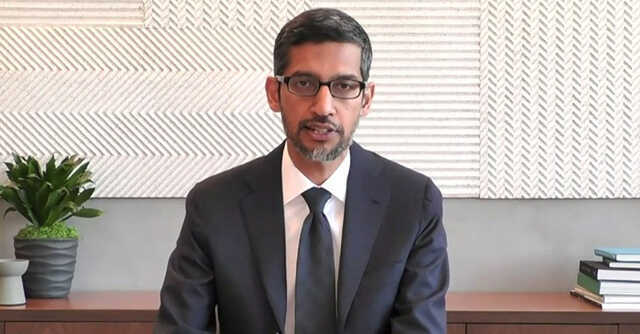
Google investing in India to build products for global markets, says Sundar Pichai


Alphabet, the parent company of Google, is committed not just to supporting startups within India but also wants to help startups build for global markets, according to Sundar Pichai, chief executive officer of Google and Alphabet.
Speaking at the Hindustan Times Leadership Summit (HTLS) 2021, Pichai said that alongside supporting startups and entrepreneurs, he wants Google itself to be building products in India that would subsequently extend to the rest of the world.
“I view India as a place where we can build things and take the products global. The first example of it is Google Pay. Understanding India’s digital payments journey with UPI (United Payment Interface), we invested in Google Pay. The foundation of that experience is what’s making its way to other markets around the world,” Pichai said.

Pichai said that as a company, he also sees products being built as “India first” in the global technology landscape. These products and services, he added, would be built in India, and "understandings of this could then be applied to scale up technology for global markets".
According to Pichai, numerous Indian startups -- many of which have recently crossed a gross valuation of $1 billion (the so-called unicorns) -- are already building products for the rest of the world.
“It’s heartening to see the number of startups proving themselves globally, in the unicorn startups of India. Last year, we committed $10 billion to the India Digitisation Fund. As part of that, we want to support companies in India that are solving newer things,” Pichai said.

“We can provide them with AI (artificial intelligence), tech and platforms to scale up ideas and reach more users. Our services would also allow companies to export out of India, so we are investing in a foundation of such an infrastructure,” he added.
Pichai also spoke about JioPhone Next – the affordable smartphone that the company built collaboratively with Reliance Jio. He underscored that the covid-19 pandemic pushed for faster adoption of technologies among many users, which has created a demand for localised technologies in India.
Describing how the company is localising its offerings to suit India’s needs, Pichai said, “It’s a deep effort, which is why we aren’t taking Android as it is. We’re investing in AI to translate better, bringing Google Lens and Voice so that people can interact with their devices in an easier way.”

However, he added that the entire process is a long-drawn one, and its impact on the market may not be instantaneous – despite the affordable price of the smartphone itself. “Something like this typically takes a long time to play out, but the impact is big as it profoundly impacts the ability for many people to get access to a digital journey. Hopefully, this will be an accelerator for the Digital India vision,” he said.
Pichai also touched upon the role that regulatory laws being enforced by different nations play on a global company such as Alphabet. He stated that while a balance between regulation and the openness of the internet is “ideal”, he remains committed to complying with necessary internet and technology regulations across all countries.
“Regulations that support the way open exchange of information works today is, of course, ideal. But it makes sense that democratic countries are thinking about what works better for their own citizens. So, both are important, and striking the right balance is what’s important here,” Pichai said.

Pichai acknowledged that he is excited about the metaverse, adding that we will see it evolving over the years. "You’d want people to interact with technology more naturally, like the way you see things, speak and so on. Computing will become naturally immersive and ambient – it will be there when you need it.
"A part of that future is going to be augmented reality (AR). Today, you have basic AR elements. Over time, it’ll be more natural and the tech won’t interfere with interacting with it and the real world – while being immersive. For this, AI will play a big part. Google Lens is one such product. Our work with Lambda, in building a conversational interface, will play a role in computing’s future. That’s what we think," he concluded.
